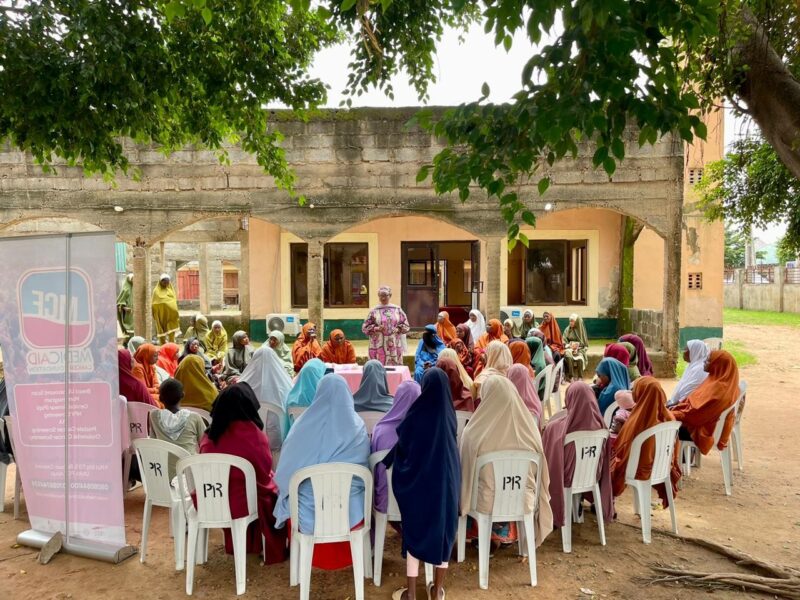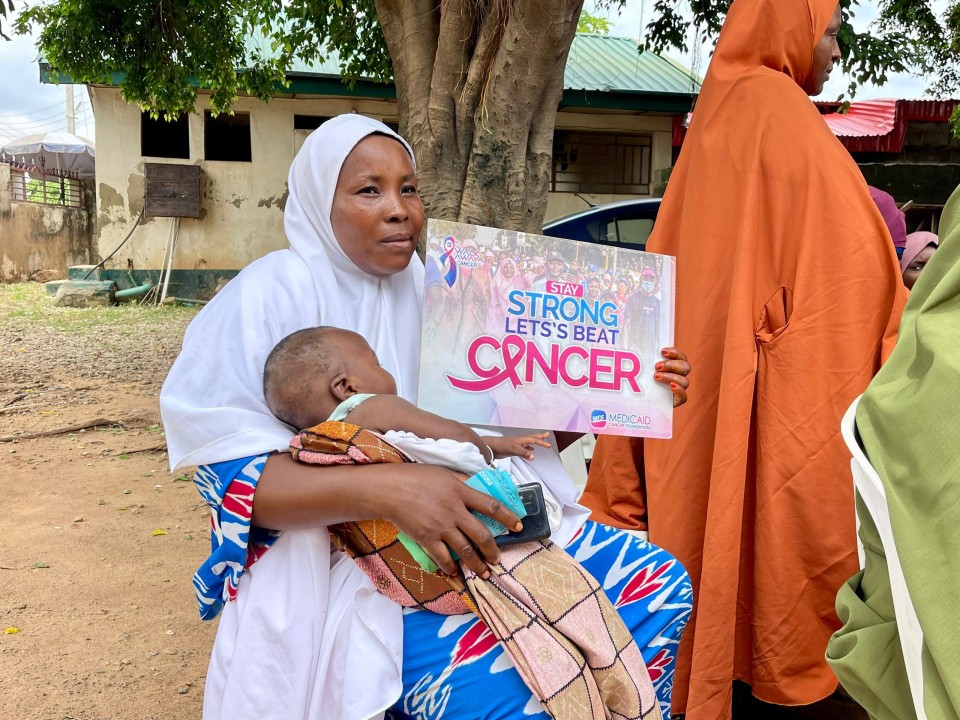Zainab Shinkafi-Bagudu shared on LinkedIn:
“Cancer, is a significant health challenge in Nigeria, primarily due to late presentation and lack of awareness. It comes to a huge economic toll, which recently necessitated the Nigerian HMS Health, Dr. Dr. Tunji Alausa to declare cancer a notifiable disease.

This reality prompted us at the MEDICAID CANCER FOUNDATION to organize monthly awareness programs in underserved communities. In July, I joined the trip to Kuje, a rural community on the outskirts of Abuja where I engaged with over 90 women and young girls on the basics of breast and cervical cancer. Our discussions centered around the signs and symptoms of these cancers, with a hands-on session where I gave practical demonstrations of self-breast examinations and self-sampling for cervical cancer screening.




Typically, we don’t stop there. We arrange transportation the following week to convey those who require further medical attention and tests to the Medicaid Radio-diagnostics & Clinics. Some cases sorted out that week included a 17-year-old girl who had 16 benign lumps removed and had developed more. We were also able to put a 3-year-old malnourished boy on a nutrition rehabilitation plan.
Such a hands-on approach provided the women with the necessary education and empowered them with the skills to take proactive steps in cancer prevention and early detection. Through continuous education, community engagement, and collaboration with grassroots communities, we can significantly reduce the incidence of preventable cancers and improve overall health and well-being.

In Nigeria, cultural beliefs and practices heavily influence health-seeking behaviors. Our advocacy efforts are therefore designed to be culturally sensitive and community-specific to achieve optimal outcomes. Engaging communities also fosters a sense of ownership and responsibility. This ensures sustainable and effective health interventions. Also, the close contact and interaction gave us insight into the thought processes of the women living in Kuje, and we can plan interventions better and raise their concerns or feedback at higher-level meetings they would not be a part of. Grassroots advocacy is the heartbeat of meaningful change.
The platform enables us to address wider queries and concerns, not necessarily related to the topic discussed. On this particular day, I was faced with questions about malnutrition in their children and vaginal discharge.
Concerning the HPV vaccine rollout, we discovered that although the girls were sensitized in their schools, parents were either not invited or didn’t attend any. As such, many simply kept their daughters at home on the days vaccinators visited their school.
The introduction of the HPV vaccine in Nigeria has been widely successful and marks a significant milestone in our fight against cervical cancer. Over 12 million girls between the age of 9-14 years have been vaccinated. However, it is still accompanied by several misconceptions and misleading information, usually disseminated via WhatsApp platforms.
During my visit to Kuje, the women had numerous questions about the HPV vaccine, which I answered. Ensuring that information and resources reach the most vulnerable and remote populations creates a positive ripple effect of knowledge and action.

HPV vaccination is a critical tool in our arsenal against cervical cancer. HPV vaccination can prevent over 90% of HPV-related cancers, including cervical cancer. Yet, global HPV coverage still stands at 12%.
In Nigeria, the National Primary Health Care Development Agency (NPHCDA) has been actively working to routinize HPV vaccine coverage, aiming to vaccinate millions of girls aged 9-14 in the coming years. Gavi the vaccine alliance is aiming for 86 million adolescent girls in the coming years. Aurélia Nguyen, Chief Programme Strategy Officer at Gavi said “There are still millions of adolescent girls at risk of contracting cervical cancer – a life-threatening yet vaccine-preventable disease that disproportionately kills women in lower-income countries. Taking urgent action to ensure no girl is left behind is imperative from a gender and equity perspective.

As a candidate for the presidency of the Union for International Cancer Control (UICC) (UICC), one of my goals is to take advocacy from the grassroots to the boardroom, national and international level. We can harness the power of education to make strides in early detection, prevention, and treatment of cancer.
Our journey to Kuje was a testament to community engagement. It is through these efforts that we can create a ripple effect of knowledge, empowering individuals to take control of their health and well-being.
In conclusion, empowering communities through education is the cornerstone of effective cancer prevention and control. By working together and leveraging the power of information, we can create a world where preventable cancers are significantly reduced.

Source: Zainab Shinkafi-Bagudu/LinkedIn
Her Excellency Dr. Zainab Shinkafi-Bagudu is, a global cancer advocate, a pediatrician, a UICC Board Member, Founder of the Medicaid Cancer Foundation, and the Chairperson of First Ladies Against Cancer (FLAC).
Dr Bagudu is working with the state ministries of health, education, and women affairs to implement programs to sustainably improve menstrual hygiene, girl-child education, economic empowerment of women, and put an end to gender-based violence. Zainab Shinkafi-Bagudu is a member of the Editorial Board of OncoDaily.


